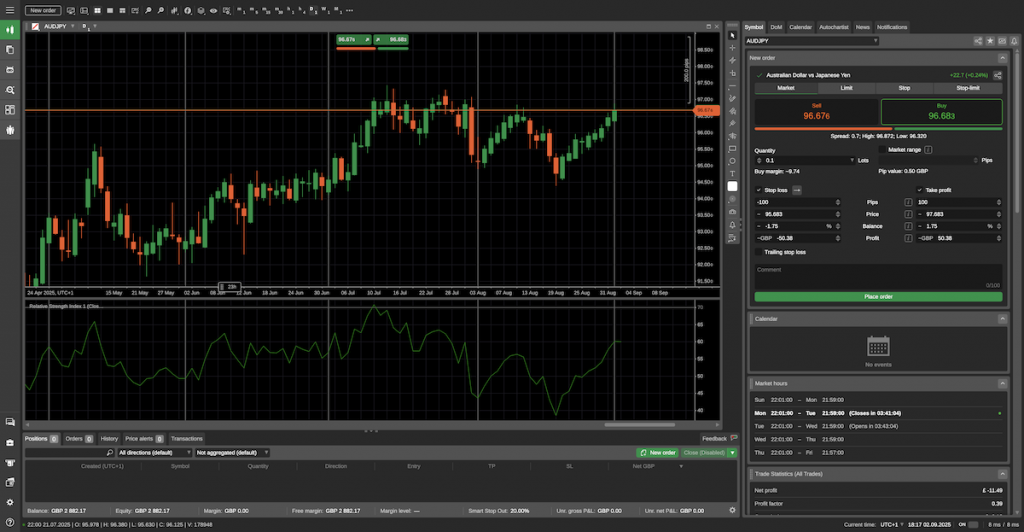Best cTrader Brokers For Swing Trading 2026



I’ve spent years swing trading on cTrader, and having used multiple brokers in that time, I can tell you the quality of the integration and offering can vary hugely. That’s why we’ve compiled a list of the best cTrader broker for swing trading.
How SwingTrading.com Chose The Top cTrader Brokers
We selected the best cTrader brokers by ranking compatible providers by their overall ratings. This combines factors unique to cTrader – including advanced order types, depth-of-market tools, automation via cAlgo, and customizable charting – before layering in our team’s hands-on testing experience.
By blending these platform-specific data points with real trading insights, we ensure our recommendations highlight brokers that unlock the full potential of cTrader rather than just offering it as a tick-box feature.
What To Look For In A cTrader Broker
Platform Features That Matter For Swing Trading
cTrader is a solid platform for traders who focus on medium-term moves. But not all brokers give the same experience. Here’s what to check:
- Charting tools: Swing trading relies on spotting trends. Make sure the broker supports all cTrader chart types and indicators. You want moving averages, RSI, MACD, and Fibonacci tools at your fingertips.
- Customizable layouts: You should be able to set up charts the way you trade. Multiple charts can be opened at once, saved templates are available, and fast switching between timeframes is helpful.
- Order types: Stop-loss and take-profit orders are crucial. Check if the broker lets you set them easily, including trailing stops. Limit and market orders should work seamlessly.

Swing trading on cTrader: spotting trends, setting stops, and holding positions for days
Execution & Spreads
Swing traders aren’t scalping, but execution still matters. A few pips’ difference can affect profits over time.
- Execution speed: cTrader brokers vary. Look for ones with stable, fast execution. Delays can cause slippage, which hurts entry or exit points.
- Spreads & commissions: Lower spreads help, but more important is consistency. Check if spreads widen during news or market gaps. Some brokers charge commissions instead of spreads. Decide which model suits your strategy.
- Swap rates: Swing traders hold positions overnight. Swap fees or rollover costs can add up. Compare brokers on this. Some cTrader brokers offer swaps with lower rates for longer-term trades.
Account Types & Leverage
Your account type affects flexibility and risk management.
- Leverage options: Swing traders usually use moderate leverage. Too high and you risk blowing up trades—too low and profits are limited. Check what leverage the broker allows on cTrader.
- Account types: Standard, ECN, or Islamic accounts can matter. ECN accounts usually offer tighter spreads but charge commissions. Standard accounts may have wider spreads but no commission. Think about which fits your swing trading style.
- Minimum deposit: Swing trading doesn’t require large deposits, but some brokers have high minimums. Make sure it’s reasonable for your capital.
Risk Management Tools
Good brokers offer tools that help protect your account.
- Stop-loss protection: Make sure cTrader allows you to set stop-loss levels easily.
- Trailing stops: This helps lock in profits as the market moves in your favor. Not all brokers support this fully on cTrader.
- Alerts & notifications: Some brokers let you set alerts for price levels or indicator signals. These are useful if you can’t monitor the market constantly.
Using cTrader for swing trading has taught me patience and the importance of risk management. The charts are clear, stop-losses and trailing stops work smoothly, but gains aren’t guaranteed. It’s a tool that helps manage risk, not a shortcut to easy wins.
Market Access & Instruments
Even if you trade only forex, it’s worth looking at instrument variety.
- Forex pairs: Check the major and minor pairs. You can look for trends in exotic pairs, too, but liquidity matters.
- Other instruments: cTrader brokers often offer CFDs on indices, commodities, and stocks. You can use these for diversification.
- Market depth: cTrader’s Level 2 data shows order book depth. This can be useful if you want insight into supply and demand.
Data & Analysis Support
Swing trading needs analysis, not just execution.
- Economic calendar: cTrader has built-in calendars through some brokers. Check if your broker offers this.
- News feeds: Some brokers include integrated news, which helps avoid surprise moves.
- Historical data: Access to past price data is crucial for testing and refining investment strategies. Make sure the broker allows you to download or view it.
Reliability & Stability
A platform crash or server downtime can ruin trades.
- Server uptime: Look for brokers with strong uptime records. Swing traders hold trades for days so that interruptions can be costly.
- Platform updates: Regular updates improve stability and fix bugs. Avoid brokers that lag in updates.
- Support: If something goes wrong, you need timely support. Check that the broker offers fast email, chat, or phone assistance.
Costs Beyond Spreads
Swing traders often overlook small fees.
- Withdrawal & deposit fees: These can add up if you move money often.
- Inactivity fees: Some brokers charge if you don’t trade for a while. Swing trading is slower, so this matters.
- Swap exemptions: Islamic or swap-free accounts may be cheaper if you hold trades long-term and qualify.
Testing The Broker First
Before committing real money, try a demo trading account.
- Demo accounts: cTrader demos let you test execution, spreads, and features without risk.
- Simulate real conditions: Make sure the demo matches the live account as closely as possible. Slippage, spreads, and swap rates should be realistic.
I never go live without trying a broker first. Running trades on a cTrader demo reveals how the platform handles orders and fees, and helps spot issues before real money is at risk.
Quick Checklist
The right ctrader broker depends on your swing trading style. Ask yourself:
- Do I need ultra-tight spreads or stable swap rates?
- Do I primarily trade forex, or do I also want to trade indices and commodities?
- How necessary is platform customization?
- Can I handle moderate leverage safely?
Write down your priorities, then compare brokers based on them.
Final Thoughts
Not all cTrader brokers are the same. Swing trading has specific needs, including solid charts, reliable execution, proper risk tools, and reasonable overnight costs.
Focus on these when choosing a cTrader broker for swing trading. Trying a demo first can save time and money.
A broker isn’t just a service – it’s part of your strategy. Pick one that supports your trading style, not one that promises big profits.
